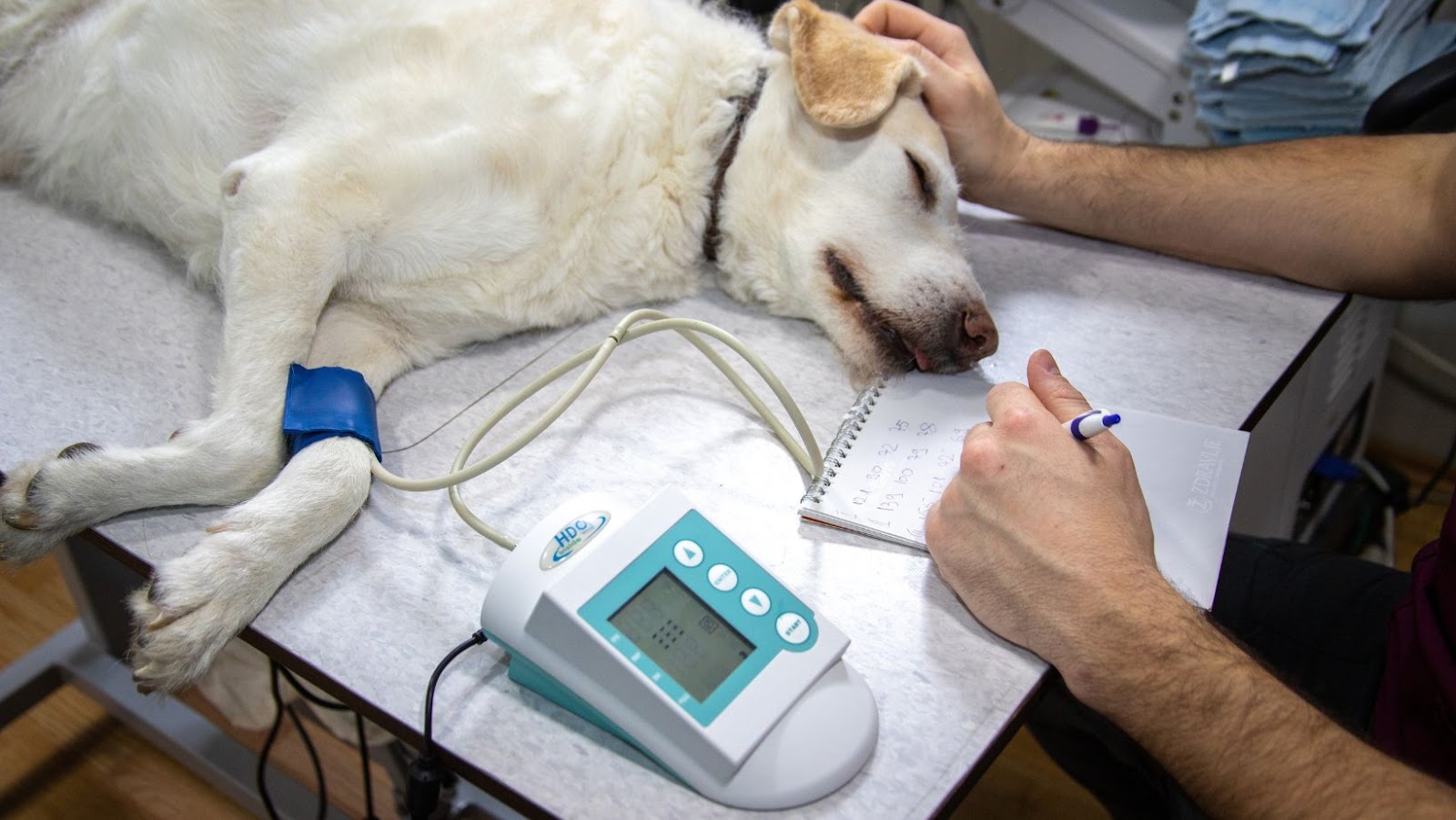Meet Michael Landa, the CEO and co-founder of The Farmer’s Dog. He is an entrepreneur who has just raised $19 million to fund his mission to revolutionize the pet food industry. With a focus on fresh, human-grade animal food, his company has already made waves in the pet food industry.
How does he use his new resources to make an even greater impact? Let’s take a closer look.
Meet The Pet Food Entrepreneur Who Just Raised $19 Million
Meet Jae-Hyun Kim, an experienced pet food entrepreneur determined to revolutionize pet nutrition and make high-quality pet food accessible to all. Jae-Hyun’s mission is rooted in his own story – as a young boy, he dreamed of having a family dog one day but had to wait until he saved up enough money first. When the day finally came, Jae-Hyun rushed out to buy the best dog food he could find but quickly realized it was too expensive for his budget. It felt wrong — why should good pet nutrition always come with such a hefty price tag?
Today, Jae-Hyun stands at the helm of his own pet food empire driven by two main goals:
- Providing customers with responsibly sourced, high quality pet foods at accessible prices;
- Raising awareness about the importance of proper nutrition in our pets’ well being.
From developing better recipes for dry kibble to launching an online service that connects customers directly with a veterinarian for personalized nutritional advice, Jae-Hyun looks far beyond what’s on store shelves and into the entire industry’s future.
Overview of the Pet Food Industry
The global pet food industry is estimated to be worth $90.2 billion in 2020 and growing exponentially yearly. With increasing demand for pet food, entrepreneurs are coming up with creative ideas to fill the gap in the market and offer pet owners a wide selection of quality foods.
One such entrepreneur is the one who recently raised $19 million intending to revolutionize the pet food industry. This article will explore their plans for the industry and how it’s set to change for the better.
Current State of the Pet Food Industry
The pet food industry is the commercial sector responsible for producing processed, packaged food products for animals, including pet cats and dogs. Pet food is typically sold as pellets, cans, snacks and treats.
In recent years, pet food innovations have significantly improved pet health and expanded the variety of diets available to meet individual pet nutrition needs. Despite the emergence of these modern advances, however, many traditional products remain popular among some dog and cat owners.
Water represents about 70 percent of a dry pet food formula by weight. The remaining percentage is divided between proteins (meat-based with first ingredient as a bona fide meat source or plant originating ones), carbohydrates (grains such as corn or wheat), fats (animal fat or plants oils) vitamins, minerals and other ingredients that may include preservatives. According to data from 2019-2024 Market Insights Report published by Grand View Research Inc., over 5 million tonnes of pet food were produced worldwide in 2018 with an estimated market value exceeding 97 billion dollars.
Today’s consumer preferences are shifting away toward more natural foods with few or no artificial ingredients — grain free options are available in most supermarket shelves along with organic options that emphasize natural sources for fat and protein content and also may feature plant-based sources as well as ingredients like probiotics for digestive support. This high demand for natural foods is likely to be reflected in rising sales figures across all market segments, from premium brands to budget ones in the next few years.
Challenges Faced by the Pet Food Industry
The pet food industry accounts for one of the largest sectors of the global food industry and has recently come under increased scrutiny. The industry faces numerous challenges, such as inappropriate labeling, poor quality ingredients, and a lack of transparency in production methods. As a result, many consumers and organizations are pushing for reform in the pet food industry.
One pressing issue is the labeling of ingredients used in pet food products. Many brands have been found to have misleading or false information about the quality and content of their products. This is problematic for trusting consumers who may incorrectly assume that a certain product is safe or nutritious for their pet when it may not be so in reality. Additionally, some brands are not transparent about where their ingredients are sourced, making it difficult to check for sustainable sourcing practices or accurate information about farming processes.
Another common challenge among pet foods is low-quality ingredients and artificial additives. In recent years there has been a growing interest in raw diets. However, even with this more holistic approach to feeding, there’s still concern over whether all natural ingredients are getting into the product as advertised. Additionally, some low-cost brands will use artificial flavorings to make their product more appealing without considering potential health risks associated with these additives.
Finally, an ongoing issue within the industry is public perception; many people associate premium prices with superior quality which can be misleading when dealing with pet products as many cheaper options also offer healthy nutrition profiles as well as premium brand options do not always do so accurately or reliably. To combat this challenge it’s important to remain informed about each brand’s reputation and sources before investing in any particular product type.
Various solutions are being proposed by organizations and individuals alike that will help introduce overdue reforms into this market sector, including better procurement protocols such as detailed ingredient labeling guidelines and improved regulation on sustainable sourcing practices amongst others. Whatever privileged route us taken it’s clear that changes need to occur if we expect consumers to trust what they’re buying for their beloved pets again soon future’s now time has never been better than now make sure your taking every step possible ensure top-tier providers cliented must be at reputable place going forward too need consider these things before making further operations cycle notes detail because soon you can expect brighter results throughout process thank you everyone attention given today limited yet amount rights worth expounds on!

The Entrepreneur’s Vision
Meet the pet food entrepreneur who just raised $19 million and is set to change the pet food industry as we know it.
This ambitious entrepreneur has a compelling vision and strategy to revolutionize pet food and make it more natural, sustainable and safe.
This article will discuss their specific plans and the potential impact they could have on the pet food industry.
The Entrepreneur’s Goals
As any successful entrepreneur knows, setting clear goals and objectives is essential for the success of any business venture. This is particularly true when establishing a vision for a pet food company. First, the entrepreneur must decide what makes their new business different from other pet food options. This can include a focus on health, convenience, sustainability or something else entirely.
Once they have identified their specific objectives, the entrepreneur must establish concrete targets and timelines to achieve them. These targets must be specific and measurable to track progress throughout the business journey. Additionally, it is necessary to identify any risks associated with pursuing these objectives, such as fluctuations in ingredient costs or customer base shifts. A thorough understanding of all potential obstacles allows the entrepreneur to create strategies for success and greater confidence when working towards fulfilling their vision for their pet food venture.
The Entrepreneur’s Strategies
Entrepreneurs aiming to launch a pet food business have many strategic considerations to succeed. First, the entrepreneur can create a business plan through research and industry best practices to provide exceptional customer service, safety and ingredients.
The following are important strategies entrepreneurs should take into account when launching a pet food business:
1. Identify Target Market: Clearly define the target customers, their needs, and how your product will meet those needs. In addition, it’s important to understand the size of the market and competitor activities.
2. Develop Unique Products: Offering pet foods made with natural ingredients or focusing on specific diets or lifestyle plans creates brand loyalty from customers. Quality control methods should be in place to ensure that all products provide optimal nutrition for pets of all sizes, ages and life stages.
3. Establish an Online Presence: Potential customers can be reached by creating an online presence where they can shop for products, access helpful nutrition information, and ask questions about pet health-related issues via forums or virtual support groups.
4. Have Prime Packaging: Customers need to be able to see clearly what types of pet food products are contained inside the packages to make educated purchases that best suit their pet’s needs and lifestyle preferences
5. Thoroughly Educate Potential Customers: Entrepreneurs need to understand that educating potential customers is essential towards gaining their trust when purchasing any kind of product related exclusively to pets’ health-care needs.. Providing user-friendly webinars, online seminars and classes pertainingto pet nutrition helps inform customers with accurate data which leads them closer towards making an informed decision when it comes time to choose which brand they will buy from regularly for them fulfill their pets’ daily nutritional requirements.
Impact of the Entrepreneur’s Vision
Meet the pet food entrepreneur who just raised $19 million for their venture. This entrepreneur has a mission to revolutionize the pet food industry and plans to do so innovatively.
This funding will allow them to pursue their goal of creating healthier, more sustainable food options for pets. Let’s explore this entrepreneur’s vision and how it could impact the pet food industry.

Potential Benefits to the Pet Food Industry
An entrepreneur’s vision can have a far-reaching impact, with potential benefits that include changes to the pet food industry. By having the capacity to think outside the box and identify areas of improvement in their target market, entrepreneurs can create innovative products or services that provide value to consumers. Pet parents often struggle with finding the right nutrition for their fur children. If an entrepreneur has expertise in offering innovative solutions, it could lead to improved pet health and well-being.
For example, a startup could bring attention to a new all natural ingredient or protein source that offers more nourishment than what currently exists. Or they could present better alternative packaging solutions that are more environmentally sustainable. Through a commitment to improving pet nutrition, entrepreneurs can work to make sure pet parents have access to the highest quality options available for their furry family members.
Another benefit is creating new jobs for people who are passionate about their profession and posses valuable skillsets and expertise within the pet food industry. Entrepreneurs also have an opportunity to inspire others by building a team of diverse professionals with experience in sales, marketing, operations, finance & accounting, customer service and many other essential functions. This allows them to develop creative strategies that add value not only through product innovation but through culture as well.
By taking initiative in rewriting industry standards and drawing upon experienced professionals from multiple backgrounds within the field of animal health & nutrition entrepreneurship can provide long lasting contributions at both local and global levels while growing the awareness of the importance of better pet nutrition options on a larger scale – setting higher benchmarks for future generations to come!
Potential Challenges to the Pet Food Industry
Pet food can be considered a mature industry, so entrepreneurs looking to make an impact need to think outside the box. Since the current focus in this industry is on marketing something new, value-added and profitable, entrepreneurs should consider potential challenges that could arise.
First, ensuring your product meets stringent safety and quality standards is essential for long-term success in the pet food industry. As an entrepreneur entering this market, staying current on regulations enforced by the Food and Drug Administration (FDA) and the American Association of Feed Control Officials (AAFCO) is recommended to ensure your product meets required quality standards for pet food. This can be difficult for business owners new to this field and not familiar with the various agencies’ requirements or testing procedures.
There is also competition from other pet food brands already established in the market, as well as from people who are making their food at home with premium ingredients. In order to compete successfully against these rivals, entrepreneurs need to create a unique brand identity that resonates with pet parents while still delivering high-quality products at competitive prices. In addition, finding the right balance between safety and cost efficiency can also be tricky regarding production and distribution costs of pet foods across different states or countries.
In addition, entrepreneurs in today’s climate often face an ethical debate over feeding animals “factory” manufactured foods like kibble instead of whole plant-based diets or homemade meals replete with fresh vegetables, beans whole grains and other complimentary human grocery items. Entrepreneurs need to educate their customers on why their product options are superior to nutrition, healthful benefits while remaining viable options that fit within budget limitations. Last but not least, innovators need to create short-term, long-term strategies for sustainability, including reducing packging waste emissions, supporting local farmers’ purchasing practices, etc.
Conclusion
The pet food entrepreneur who recently raised $19 million is looking to seriously impact the pet food industry. He wants to create a pet food that is both healthy and affordable and is looking to disrupt the industry with his innovative approach to pet nutrition.
His plans could drastically change how pet owners feed their furry friends, and his $19 million in funding could be the key to making that a reality. Let’s look at the potential implications of his innovative ideas.
Summary of the Entrepreneur’s Vision and Impact
The team behind Freshpet has created an ambitious vision to revolutionize the pet food industry by providing fresh, natural, nutritious meals to dogs and cats. Their vision is to shift the industry focus away from low-quality canned and processed products, to higher quality foods with fewer artificial ingredients that are fresher and more flavorful. They are making strides toward this cohesive mission by offering fresh lines of recipes for each species—dog or cat— in various forms including loose kibble, chubs, and patties. These products must be refrigerated since they contain no preservatives or other additives like fillers, artificial colors or flavors often used in traditional dry pet foods.
The Freshpet team is additionally doing their part to reduce waste by creating pet food packaging that is recyclable, compostable or made with renewable resources. Their words reflect this commitment: ‘Our mission is to be the driving force in redefining how companion pets receive vital nutrition.’ Overall, Freshpet’s vision and mission have potential to significantly influence the pet food industry towards healthier options for dogs and cats while reducing environmental waste.



More Stories
Mitigating Risks of Uncontrolled Gambling: Common Issues and Tips to Remain Responsible
The Origins Of The Most Popular Casino Games
Cricket Match Result Predictions Using 1xBet Data Tools